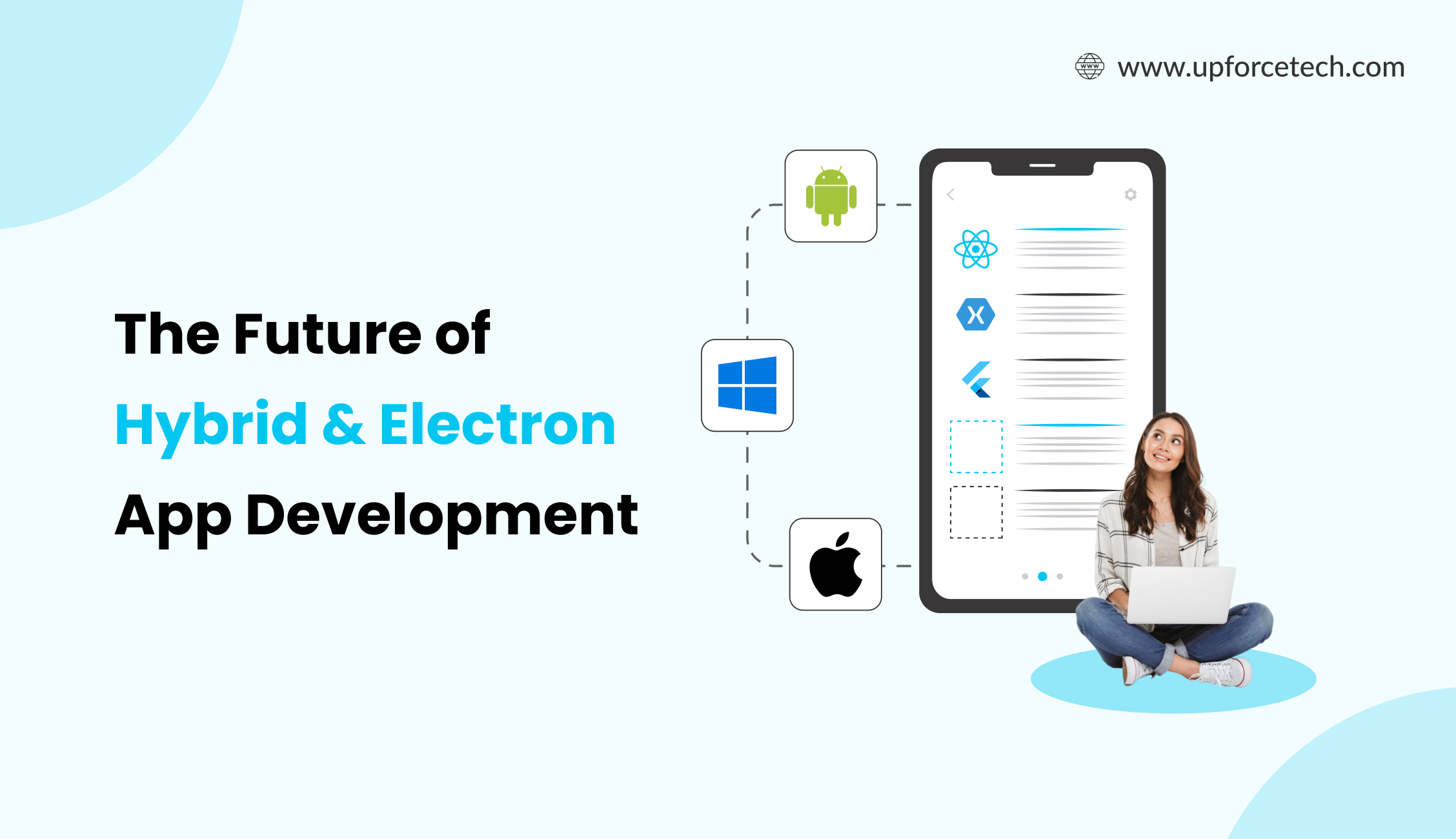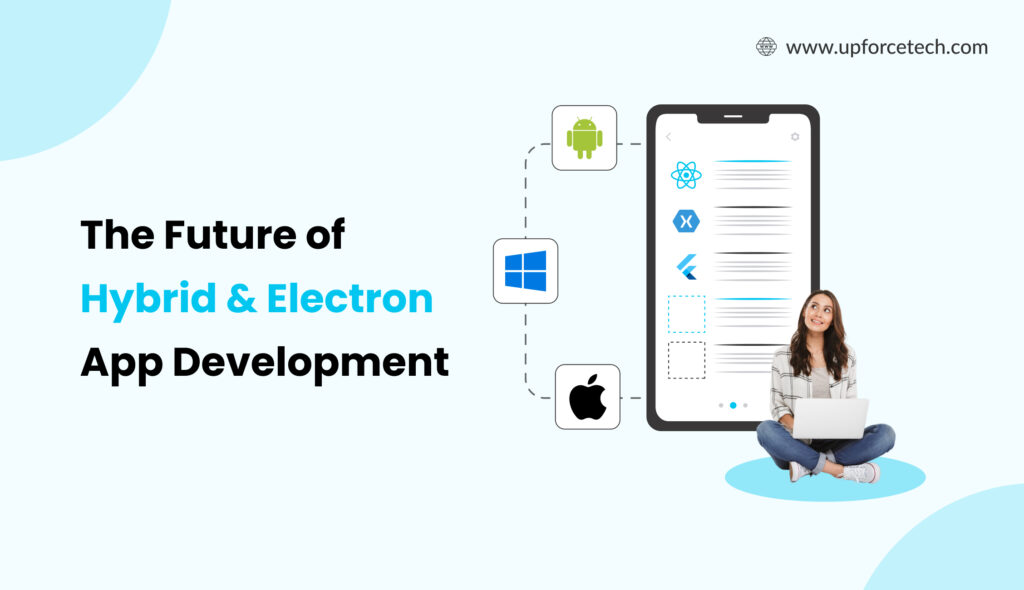Table of Contents
The Future of Hybrid & Electron App Development

The app development landscape is constantly evolving. With the ever-increasing demand for user-friendly and accessible applications, developers are constantly seeking innovative solutions. Two prominent contenders in this arena are hybrid app development and Electron app development. But how do they fare in the face of emerging trends like progressive web apps (PWAs) and low-code development? This blog post dives into the future of these technologies, analyzing their strengths, weaknesses, and potential trajectories.
Understanding Hybrid & Electron App Development
Hybrid apps combine elements of native and web applications. They use web technologies like HTML, CSS, and JavaScript. These apps are wrapped in a native container, enabling deployment across multiple platforms with a single codebase. This approach reduces development costs and speeds up time-to-market, making hybrid apps a popular choice.
Conversely, Electron apps allow developers to create cross-platform desktop applications using web technologies. By leveraging Chromium and Node.js, Electron apps provide a robust framework. This framework supports applications that run seamlessly on Windows, macOS, and Linux operating systems. Consequently, Electron is a preferred choice for companies developing feature-rich desktop applications with a consistent user experience.
Key Factors Driving Adoption
Several factors contribute to the growing adoption of hybrid and Electron app development:
Cost Efficiency: Developing a single codebase for multiple platforms reduces costs and the need for separate development teams.
Cross-Platform Compatibility: Hybrid and Electron apps ensure a consistent user experience across devices and operating systems. This enhances accessibility and usability for diverse users.
Flexibility and Scalability: The modular nature of hybrid and Electron frameworks allows for easier updates and modifications. This adaptability meets evolving business needs and technological advancements.
Performance Improvements: Advances in hybrid and Electron frameworks have significantly improved app performance. They now rival native applications in speed and responsiveness.
Trends Shaping the Future
Several key trends are poised to shape the future of hybrid and Electron app development:
AI and Machine Learning Integration: Integrating AI into hybrid and Electron apps will enable personalized user experiences and predictive analytics. Automation of routine tasks will also become possible.
Internet of Things (IoT) Connectivity: As IoT ecosystems expand, apps that integrate with connected devices will become more valuable. Industries such as healthcare and manufacturing will particularly benefit.
Enhanced Security Features: With rising cybersecurity threats, robust security measures in hybrid and Electron apps will be essential. Protecting sensitive data and maintaining user trust will be priorities.
Progressive Web Apps (PWAs): PWAs offer an app-like experience through web browsers. They are lightweight and fast-loading, gaining popularity for their ability to work offline and deliver native app functionalities without installation.
The Future Landscape: Collaboration and Co-existence
Hybrid and Electron app development will likely continue to evolve alongside PWAs and low-code solutions. Here’s a glimpse into potential future scenarios:
- Hybrid Apps: Frameworks and optimizations could address performance limitations, making hybrid apps even more competitive. Integration with PWAs could lead to a blended approach, leveraging the strengths of both technologies.
- Electron Apps: Improved security measures and potential size reduction techniques could further solidify Electron’s position for desktop app development. Collaboration with low-code platforms might open doors for non-coders to create basic Electron apps.
Choosing the Right Path:
The choice between hybrid, Electron, PWAs, and low-code development depends on your specific project requirements, budget, and target platforms. Consider factors like:
- App Complexity: Complex functionalities might favor Electron apps for native performance.
- Development Resources: Team experience and skillset can influence the technology choice.
- Time to Market: Hybrid apps and low-code platforms might offer faster development cycles.
Case Studies and Success Stories
Case Study 1: Streamlining Operations with a Hybrid App
Client Background: A leading logistics company wanted to enhance efficiency in their supply chain operations.
Solution: UpforceTech developed a custom hybrid app. It integrated real-time tracking, inventory management, and communication features. The app enabled seamless collaboration between warehouse staff, drivers, and customers, resulting in faster delivery times and improved customer satisfaction.
Outcome: The hybrid app reduced operational costs by 30% and increased order fulfillment rates by 20% within six months. The client reported enhanced visibility into supply chain processes, enabling proactive decision-making and scalability.
Case Study 2: Empowering Sales Teams with an Electron App
Client Background: A global sales organization needed a robust desktop application for sales operations and data management.
Solution: UpforceTech developed an Electron-based sales application. It integrated CRM functionalities, reporting tools, and offline capabilities. The app provided sales teams with real-time access to customer data, sales pipelines, and analytics.
Outcome: The Electron app accelerated sales cycles by 40% and increased productivity by enabling seamless data synchronization across devices. The client achieved a 25% increase in sales revenue within the first year of deployment, showcasing the transformative impact of Electron technology.
Emerging Technologies and Innovations
Emerging technologies and innovations are shaping the future of hybrid and Electron app development. These advancements hold immense potential for businesses seeking to leverage cutting-edge solutions.
1. AI and Machine Learning Integration
AI and machine learning in hybrid and Electron apps enhance user experiences and optimize business processes. AI-powered algorithms analyze user behavior to deliver personalized content and recommendations. For instance, an e-commerce app with AI can recommend products based on past purchases and browsing history, enhancing customer engagement.
Moreover, AI and ML automate routine tasks and decision-making processes. This includes customer support inquiries, data analysis, and inventory management. Automation reduces operational costs and allows human resources to focus on strategic initiatives.
2. Internet of Things (IoT) Connectivity
IoT devices and sensors present new opportunities for hybrid and Electron app developers. IoT-enabled apps collect real-time data from sensors, enabling businesses to monitor performance metrics and optimize operations. For example, in healthcare, IoT-connected apps gather vital signs from wearable devices and transmit this information to healthcare providers in real time.
3. Enhanced Security Features
With rising cybersecurity threats, robust security measures in hybrid and Electron apps are crucial. Developers must implement encryption protocols and secure authentication mechanisms. This protects against risks and ensures compliance with regulations such as GDPR and CCPA. Biometric authentication and multi-factor authentication (MFA) can enhance security and instill trust among users.
4. Progressive Web Apps (PWAs)
PWAs combine the benefits of web and mobile applications. Built using web technologies like HTML5 and CSS3, PWAs deliver a native app-like experience through web browsers without installation. Key features include offline access, fast loading times, and responsive design. This makes them ideal for businesses looking to reach a broader audience.
5. Quantum Computing and Enhanced Processing Power
Quantum computing promises to revolutionize app development with unparalleled processing power. Integrating quantum computing into hybrid and Electron apps could open new possibilities for data analysis and encryption. This advancement will solve complex problems at unprecedented speeds.
6. 5G Connectivity and Edge Computing
The rollout of 5G networks and the growth of edge computing will impact hybrid and Electron apps. With ultra-fast connectivity and low latency, 5G will enable real-time data transfer and enhanced streaming quality. Edge computing brings data processing closer to the source, reducing latency and improving reliability, especially in IoT applications.
7. Augmented Reality (AR) and Virtual Reality (VR) Integration
AR and VR technologies are becoming prevalent across industries like retail and healthcare. Integrating AR and VR into hybrid and Electron apps will provide immersive experiences. For example, a retail app with AR features allows users to visualize products in their environment before purchase, enhancing the shopping experience.
8. Blockchain and Decentralized Applications (DApps)
Blockchain technology and DApps offer secure and transparent transactions. Integrating blockchain into hybrid and Electron apps enhances data security and enables secure payments. For example, a supply chain management app built on blockchain ensures product traceability, reducing counterfeit risks.
9. Sustainability and Green Technologies
As environmental concerns grow, there is an emphasis on sustainable technologies. Hybrid and Electron app developers can optimize code for energy efficiency and minimize the carbon footprint. Apps can be designed to run efficiently on low-power devices and implement energy-saving features.
Conclusion
As businesses embrace digital transformation, hybrid and Electron app development will shape the future of applications. Leveraging these technologies allows organizations to innovate, reach broader audiences, and deliver superior user experiences.
At UpforceTech, we drive innovation in hybrid and Electron app development. Whether launching a new app or optimizing an existing one, our team is ready to help achieve your goals. Contact us today to discover how UpforceTech can empower your business with cutting-edge solutions.
Embrace the future of app development with UpforceTech. Together, we can turn your vision into reality and propel your business to new heights.
Visit UpforceTech.com to explore our comprehensive range of services and discover how our hybrid and Electron app development expertise can transform your business.
Sign up for the free Newsletter
Innovation distinguishes between a leader and a follower
Steve Jobs
FAQs
Hybrid apps are applications that combine elements of both native and web apps. They are built using web technologies like HTML, CSS, and JavaScript and are wrapped in a native container, allowing them to run on multiple platforms with a single codebase. In contrast, native apps are developed specifically for one platform, using languages and tools that are native to that platform (e.g., Swift for iOS, Java for Android).
Businesses should consider hybrid app development because it offers several advantages, including reduced development costs, faster time-to-market, and the ability to maintain a single codebase for multiple platforms. This approach ensures a consistent user experience across devices and operating systems, making it an efficient solution for reaching a broader audience.
Electron is a framework that enables developers to create cross-platform desktop applications using web technologies like HTML, CSS, and JavaScript. It leverages Chromium and Node.js, providing a robust environment for building applications that run seamlessly on Windows, macOS, and Linux. Electron is popular because it allows developers to use a single codebase for multiple operating systems, simplifies the development process, and offers powerful tools for creating feature-rich applications.
Security in hybrid and Electron apps is ensured through several measures, including encryption protocols, secure authentication mechanisms, and regular security updates. Developers can implement features like biometric authentication and multi-factor authentication (MFA) to enhance security further. Additionally, following best practices for secure coding and data handling helps protect against vulnerabilities and cyber threats.
Advances in hybrid and Electron frameworks have significantly improved their performance, narrowing the gap with native apps. While native apps still have a slight edge in terms of speed and responsiveness, hybrid and Electron apps offer adequate performance for most use cases. Optimizing code and leveraging the latest tools and technologies can further enhance the performance of these apps.
Hybrid and Electron apps support scalability through their modular architecture, which allows for easy updates and modifications. This flexibility makes it simple to add new features, improve functionality, and accommodate growing user bases. Cloud services and scalable backend infrastructure can also be integrated to ensure that the apps handle increased demand efficiently.
Emerging trends in hybrid and Electron app development include the integration of AI and machine learning, IoT connectivity, enhanced security features, and the rise of Progressive Web Apps (PWAs). Other trends include the adoption of 5G connectivity, edge computing, augmented reality (AR) and virtual reality (VR) integration, blockchain technology, and a focus on sustainability and green technologies.
UpforceTech specializes in delivering innovative hybrid and Electron app development solutions tailored to the unique needs of businesses. Our experienced team combines technical expertise with a deep understanding of industry trends to create scalable, high-performance applications. We offer a client-centric approach, ensuring that our solutions align with business objectives and user needs. Visit UpforceTech.com to learn more about our services and how we can help transform your business.
The primary cost advantage of hybrid and Electron app development is the ability to use a single codebase for multiple platforms. This reduces the need for separate development teams and lowers overall development and maintenance costs. Additionally, faster development cycles and shorter time-to-market contribute to cost savings, making these approaches more economical for businesses.
Hybrid and Electron apps enhance user experience by offering consistent and seamless interactions across different devices and operating systems. Through comprehensive UX research and design processes, developers can create intuitive interfaces, smooth navigation, and engaging interactions. This focus on UX ensures that the apps meet user expectations and drive engagement and retention.

